Climate change: have we passed the point of no return?
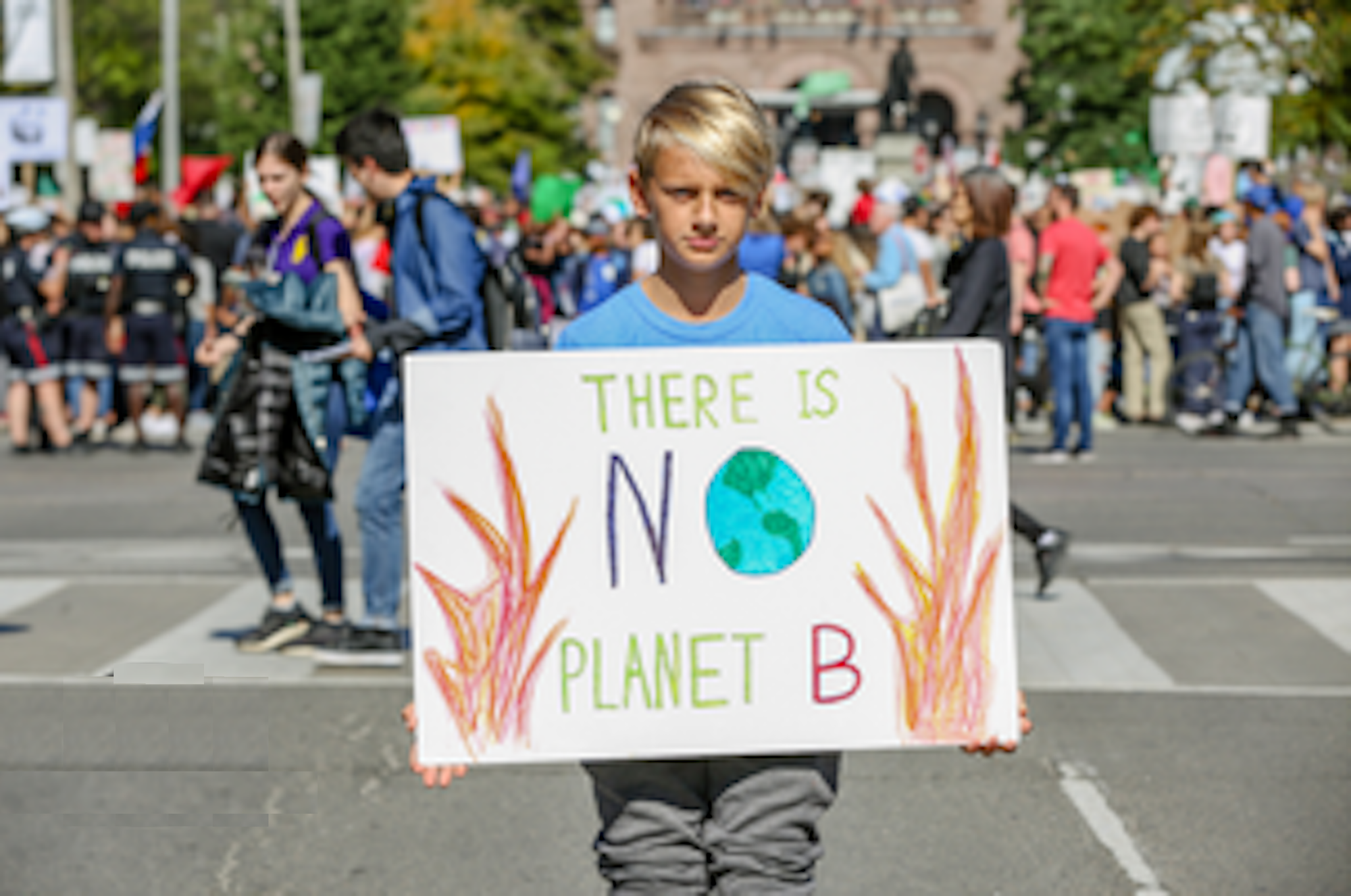
TetleysTLDR: The summary
We’re standing on the cliff-edge. Some climate tipping points may already be gone: collapsing ice sheets, dying coral, a faltering Amazon but the wider point of no return hasn’t fully passed. That’s why this moment is a fight, not a funeral. The crisis isn’t just CO₂ it’s capitalism, extraction and political cowardice. Fossil-fuel barons, banks and their bought-and-paid-for politicians have driven us here, knowing the poorest: workers, Black and brown communities, the Global South would take the hit first. But fatalism is a gift to the very bastards who caused this. Every tonne of CO₂ avoided still matters. A just transition demands public ownership, mass investment, global climate justice, and the redistribution of wealth and power from extractors to communities. This is class struggle on a burning planet. Either we mobilise now, or we let the profiteers write the epitaph for our future that no one will be left to read.
TetleysTLDR: The long bit
We Stand at a moment of moral reckoning. The planet is warming. The systems that sustain life and civilisation are creaking under the weight of our fossil-fuelled society. The question is not merely can we stop it, but will we stop it: who will pay for the damage, and what kind of society are we willing to survive as if the worst arrives. From a left-wing vantage point, this is not simply a technical problem of carbon molecules; it is a crisis of power, capital, justice and democracy.
The science: tipping points, feedback loops and 'irreversible' damage
Let’s begin with the truth: the science is stark. The idea of a 'point of no return' in climate change refers to thresholds, known as 'tipping points' within Earth’s systems, beyond which changes become self-reinforcing and effectively irreversible on human timescales. Scientists for Global Responsibility
Examples: the collapse of the huge ice sheets on Greenland or West Antarctica, the thawing of permafrost releasing methane and CO₂ in large volumes; the die-off of the Amazon rainforest turning it from an active carbon sink into a carbon source; a breakdown of the Atlantic Meridional Overturning Circulation (AMOC). SciTechDaily
One authoritative article summarised: "Projections of what our thermally-challenged world will be like … are so complex… the real flies in the ointment… are so-called ‘tipping points’, which can see dangerous elements of our changing climate locked onto courses that are impossible to turn around.” Scientists for Global Responsibility
And the picture is worsening. New research shows that these tipping points may lie at lower warming levels than previously thought, that some may already have been crossed, that there are more of them than once envisaged. Space.com
NASA, moreover, states that “while the effects of human activities on Earth’s climate to date are irreversible on the timescale of humans alive today, every little bit of avoided future temperature increases results in less warming that would otherwise persist for essentially forever.” NASA Science
That statement is both chilling and empowering. It means that even if damage is now baked in, every decision still matters. Yet we also must not fall into fatalism. Some analysts caution that while we face dire risks, the narrative of 'all is lost' is inaccurate: we haven’t completely passed all points of no return. globalenergyprize.org
This nuance matters, because how we frame the crisis determines whether we mobilise or despair.
Have we crossed it? The brutal truth
So, have we passed the point of no return? The short answer: maybe, in some regards already, but not necessarily wholly for all systems. The longer answer: yes in parts, and dangerously close in many more. In one of the most dramatic findings, scientists now believe the Amazon rainforest could reach a tipping point, when it loses its natural ability to regenerate and becomes permanently degraded possibly by 2050. Yale E360
Others argue that coral reef ecosystems already have crossed tipping thresholds.
“I would say that we have already passed the tipping point for coral reef ecosystems, for example.”Carbon Brief
Meanwhile, the 1.5 °C warming threshold, long held up as the safe ceiling, is increasingly out of reach. Some predict that crossing will occur imminently. SciTechDaily
Yet other scientists caution that 'point of no return' does not mean everything ends immediately; rather many changes may be delayed, but the risks of runaway change escalate. FactCheck.org
From a left-wing vantage this is a moment of stark clarity: the stakes are existential. If the systems that regulate global climate, sea-levels, biodiversity, food-chains collapse, the burdens will fall overwhelmingly on the world’s working people, the Global South, marginalised communities, the very people who have contributed least to the emissions causing this.
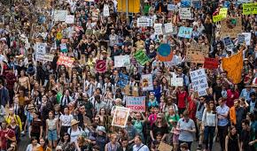
The politics of failure
Why are we here? Why has the fossil-fuel economy been allowed to ramp up inexorably for more than a century? Why do governments still dither while the planet burns? The root lies in power: fossil capital, neoliberal ideology, and political capture. We have seen how fossil fuel corporations (and the financial and industrial complexes around them), comfortable in the status quo, have systematically delayed, obfuscated and lobbied to maintain the business-as-usual that benefits them. Governments, especially right-wing and centrist ones, have accommodated them: shielding them with subsidies, ignoring externalities, legitimising extraction at any cost. The logic: growth above all; extraction now, problem later. On the left, we have too often accepted framing that climate is a technical challenge to be solved by incremental reforms or markets alone. Yet that framing underestimates the scale of the structural change needed. If we truly mean just transition, then we must challenge capital, challenge austerity, challenge the ideology of endless accumulation. The climate crisis demands nothing less than a social and economic transformation.
The politics must reflect that. We must demand: wholesale investment in renewable infrastructure, worker retraining, public ownership or strong regulation of energy utilities, just transition for coal and oil communities, massive public spending, and genuine international climate justice, recognising the Global South must not carry the costs while the Global North produced the majority of emissions. Instead, in many countries (including the UK, US, EU) we see weak policies: token green-wash, continued licensing of fossil fuel projects, pathetic emission cuts and markets that let carbon off cheaply.
Meanwhile, the burden of climate-driven disaster falls on low-income households: heatwaves, flooding, lost jobs, forced migration. The rich largely escape or are compensated; the poor don’t. It is not hyperbole to say that, if the point of no return is being crossed, it is being crossed on the backs of working people, brown and Black communities, and the Global South. That is the injustice at the heart of climate breakdown.

Climate denial and the political right
Climate denial is a right wing thing? but why? Surely they must see the same things the left sees as the planet gives us un-ignorable signals. There’s no single reason the right denies or downplays climate change, but there is a clear pattern: it protects their power, their profits, and their worldview. Here’s the anatomy of right-wing climate denial in plain terms.
1. Money: fossil capital owns the right
Much of the modern right is bankrolled by oil, gas and coal interests. Accepting the science means accepting the need to phase out the very industries funding their campaigns, think tanks and media outlets. Denial is cheaper than losing a donor.
2. Ideology: climate action requires collective solutions
Right-wing ideology is built on markets, deregulation and the supremacy of private capital. But climate change demands state intervention, planning, public ownership, redistribution and regulation, everything the right claims to despise. Rather than change their ideology, they attack the science.
3. Culture war: denial is a tribal badge
Climate change became bundled with culture-war identity. In the US it’s MAGA gospel: in the UK it’s Tory talk-radio fodder, in Reform UK Ltd circles it’s treated as woke mythology. If your political tribe defines itself against ‘experts’, ‘greens’, and ‘metropolitan elites’, you deny climate change because doing otherwise feels like betrayal.
4. Short-termism: profit today, consequences later
Right-wing policy is structurally short-sighted: quarterly profits, electoral cycles, donor interests. Climate action requires long-term thinking, long-term investment, and confronting powerful industries. Denial offers an easier path: kick the can, blame someone else, stay in office.
5. Fear of redistribution
Climate action means redistribution: taxing carbon, taxing the rich, funding global South adaptation, investing in public infrastructure. The right fears that acknowledging the climate crisis opens the door to structural change: in other words, the end of their economic model.
6. Strategic disinformation
Fossil-fuel companies ran tobacco-style disinformation campaigns for decades. The right-wing media ecosystem swallowed it whole and still churns it out. Denial is no longer an error; it’s a product.
7. Psychological convenience
Admitting the truth means accepting responsibility. Accepting responsibility means changing how society works. Denial is comforting: no guilt, no sacrifice, no structural transformation.
The Bottom line:
The right denies climate change not because the science is unclear, but because accepting it threatens the political and economic foundations of right-wing power. It’s easier for them to torch the planet than to challenge fossil capital or admit their ideology has failed.
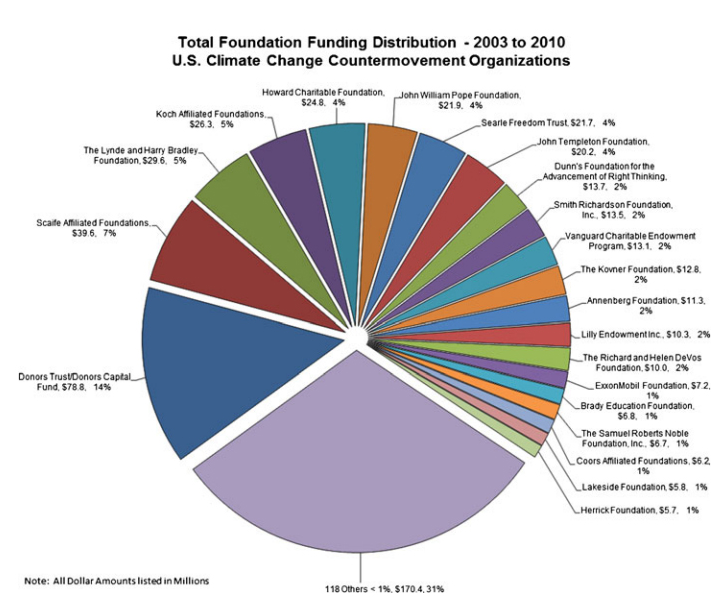
And what of the left?
The left doesn’t deny climate change but it absolutely has its own failures, blind spots and self-inflicted wounds. They’re different from the right’s outright denialism, but still damaging.
1. Technocratic complacency
A big chunk of the centre-left treats climate change as a policy puzzle, not a systemic crisis. They cling to market fixes: carbon trading, offsetting, gentle incentives when what’s needed is a rupture with fossil capital. It’s denial-lite: acknowledging the science, but refusing the scale of action it demands.
2. Fear of confronting capital
Even many social democrats shy away from tackling the power of oil majors, banks and energy conglomerates. They tiptoe, tinker, and issue timid targets because they’re terrified of being painted as anti-business. They accept the diagnosis, but deny the cure.
3. Electoral cowardice
Too many left parties believe climate ambition will lose votes among workers, so they adopt half-measures and muddled messages. Instead of building a class-based climate programme, they water everything down to avoid tabloid headlines.
4. Internal contradictions
The left wants to be the party of workers and the planet but often fails to connect the two. This allows the right to weaponise ‘jobs vs climate’ rhetoric. The left knows this is false, but often lacks the political courage to say so loudly.
5. Green moralism
Some left-adjacent movements slip into individual moral purity: recycling, veganism, lifestyle policing, instead of mass politics, unions, public ownership and class struggle. This alienates working-class communities who already bear the brunt of the crisis and who are hoovered up by the right.
6. NGO capture
A lot of 'green' politics on the left gets funnelled through NGOs funded by philanthro-capitalists which means radical demands are sanitised, structural change is avoided, and critique of capitalism is muted. It’s soft climate denial wrapped in activism.
7. Fatalism dressed as realism
Parts of the left slide into doomism, 'it’s already over', 'we’re post-collapse', which is just the mirror image of right-wing denial. Both lead to inaction. Both serve fossil capital.
Bottom line:
The left doesn’t deny the climate crisis but too often it denies what solving it actually requires: class struggle, redistribution, confronting corporate power, and a democratic transformation of our entire economy. The right denies the science; the left sometimes denies the scale.
 ‘The moment of crisis has come. We must now recognise that we have a moral responsibility to act.’
‘The moment of crisis has come. We must now recognise that we have a moral responsibility to act.’
David Attenborough
The moral imperative
How should we respond to the possibility that some tipping points are already breached? The answer: with urgency, clarity, solidarity, and radical ambition.
- Urgency Time is shorter than many politicians will admit. Every year of delay locks in more warming, more sea-level rise and more suffering. As NASA notes: “every little bit of avoided future temperature increases results in less warming that would otherwise persist for essentially forever.” NASA Science
- Clarity The language must match the crisis. We can’t keep talking about 'sustainability' or 'net zero by 2050' as though business-as-usual continues. We must talk in terms of systemic change, just transition, climate emergency mobilisation.
- Solidarity The burden must be equitably shared. The Global North must lead in cutting emissions, fund mitigation and adaptation in the Global South, and accept historical responsibility. Workers in carbon-intensive industries must not be sacrificed without a secure alternative.
- Radical ambition We need aggressive public investment in zero-carbon infrastructure, public ownership of grids and utilities, massive R&D in storage, heat pumps, alternatives. We need to dismantle the political and economic power of fossil fuel capital. We must extend public democratic planning, not just rely on markets.
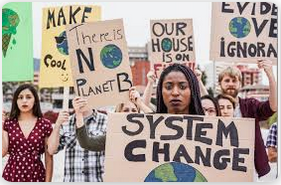
Why defeatism is the enemy
Some say: “Well, if we’ve passed the point of no return, what’s the point?” That is precisely the trap of pessimism. If the world really was doomed, then capitulation would be rational, but it is not because the science says some pathways still exist, some damage still avoidable, and every tonne of CO₂ avoided matters. UC San Diego Sustainability Ambassadors
There is no guarantee of salvation but to surrender is to hand victory to fossil capital, to accept that the future is determined by late-capitalist extraction. The left must reject fatalism. We must treat this as existential but winnable by redistributing power from the extractors to the many.
A working-class orientation
For too long climate discussion has been dominated by greens, technocrats and elites. But climate change is deeply working-class: it threatens livelihoods, houses, jobs, health, migration, food security. The left must make climate policy into class policy. Here are a few concrete directions:
- A Just Transition Fund, financed by fossil-fuel profits and windfall taxes, to guarantee workers in coal, oil & gas sectors retraining, living wage and pension protections, participative workplaces in renewables.
- Public-ownership or cooperatives in utilities and grids, so that control is moved away from profit-driven multinationals and towards community and worker control.
- Emergency-style public investment in renewable infrastructure (wind, solar, tidal) plus low-carbon heating (heat pumps, district heating) and mass insulation of existing housing, especially social housing.
- A Green Jobs Programme: massive state-led creation of jobs in renewable manufacturing, retrofitting housing, ecological restoration, rail & public transport. Under full trade-union oversight and democratic management.
- Universal basic income: to remove the late state capitalism incentive bias.
- International climate justice: reparations, debt cancellation, technology transfer, and adaptation funds for the Global South, acknowledging that their crisis is our crisis and our emissions came mostly from the North.
- Carbon extraction ending: halt new fossil-fuel licences, phase out production, impose a high carbon tax (returning revenue to workers and communities), integrate mining regulation, and transition communities in extraction zones to new economies.
- Rethink growth: accept that endless GDP growth is inconsistent with planetary boundaries. Introduce measures of wellbeing, planetary health, social justice: not just growth for growth’s sake.
- Eco-crime to be treated like war crimes. And the criminals treated accordingly.
Why cutting emissions alone isn’t enough
Yes: the first order policy is to drastically cut greenhouse gas emissions, But emissions cuts alone will not fix the deeper capitalist logic of extraction, accumulation and inequality. The planet doesn’t only need fewer tonnes of carbon, it needs fewer extraction-zones, fewer remote communities sacrificed for pipelines, fewer financialised commodities, fewer mega-projects ignoring local voices and ecosystems. The left must connect climate to housing, health, workers’ rights, decolonisation and democracy. For instance: the same corporate power that drives fossil-fuel extraction often drives housing speculation, health privatisation, racialised labour exploitation. Tackling climate means tackling all of that. A 'green economy' cannot simply replicate the old economy but painted green. It must be a new economy: democratic, egalitarian, locally rooted, globally just.

The politics of hope and fear
We must mobilise fear, not as paralysing panic but as righteous anger and urgency. The horror of flooded slums, drowned islands, collapsing ecosystems must spur us. At the same time, we must mobilise hope because working people have power, because low-carbon technologies exist, because history shows radical change is possible (look at the New Deal, wartime production, welfare struggles). The left must craft a narrative: the future is ours to build, if we act now.
Accountability and power
Let’s be clear: those who created this crisis must be held to account. Fossil-fuel companies that misled the public; governments that granted licences; banks that financed extraction; trade deals that locked in emissions. The left must demand transparency, public inquiry, removal of corporate influence from politics and genuine democratic control over energy and resources. In addition, climate policy must be inclusive of those often sidelined: Indigenous peoples (who defend the Amazon and boreal forests), women (especially in Global South communities), migrant workers, disabled people and racialised communities bearing disproportionate burdens. Climate justice is social justice.
The case for radical redistribution
The climate crisis is not just an environmental problem, it is the ultimate redistribution problem. Historically, the wealthiest countries and the elite classes in all countries have caused the bulk of emissions. The poorest countries and communities will bear most of the costs. That is unjust. Thus climate policy must involve redistribution: of wealth, resources, decision-making power. Windfall profits from oil must be captured. Carbon taxes must be progressive (rich pay more). Public investment must serve common good, not shareholder dividends. Global aid flows must reverse the flow of value from poor to rich. Labour must not bear the brunt of adjustment while capital is spared.
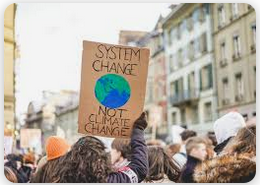
What failure really looks like
We must envision what failure will entail: not to despair, but to motivate. Failure: millions displaced by sea-level rise, island nations lost, food systems collapsing, mass migration, climate-driven conflict, biodiversity extinction, broken infrastructure, society fraying under crisis. Many of those outcomes are now probabilistic, not hypothetical. Fewer remain avoidable if we delay further. We must also recognise that even with 'success' (significant emissions reduction) we may still face serious trauma: floods, heatwaves, storms, species loss, food disruption. So the task is not only mitigation, but adaptation, resilience, economic transformation. Even then, we must keep justice front-and-centre: we must not allow adaptation to become another vehicle for profit, displacement, and race/class injustice.
The UK/Europe context (briefly)
In a country like the UK, the left should be mobilising on: socialising energy infrastructure (grids, storage, renewables), mass insulation of homes (especially in working-class areas), public transport and rail as climate and jobs policy; resisting new fossil-fuel projects (in the North Sea, fracking, etc.), ensuring major corporations pay their share. The same logic applies across Europe: climate policy must intersect with housing policy, labour policy, and public services. Failure to link those will render climate policy technocratic and elitist, further alienating working-class voters.
The moral duty to future generations
We are trustees of the planet for future generations. If we allow irreversible changes, melting ice sheets, collapsed coral ecosystems, vanishing rainforests we are robbing children, grandchildren, the unborn of the world we inherited. This is not abstract: the legacy we leave is physical, biological, social. From a left-wing standpoint, this implicates our idea of solidarity across time as we currently see solidarity across class and geography. Justice must mean that children of the Global South born in future decades are not sacrificed for the consumption of the Global North in the past. It is immoral that a handful of corporations and elites locked-in decades of emissions while the rest of us face the consequences.
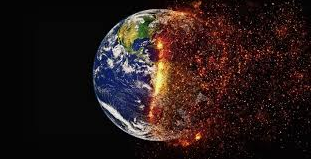
A call to arms
So, have we passed the point of no return? In some sense yes: some systems may now be irrevocably on their way to collapse; but in the broader sense, not yet entirely. This duality is where the left must operate, with urgency and optimism. We must act decisively, globally, and justly. Our political influencers should at the very least be demanding:
- Immediate moratorium on new fossil-fuel exploration, extraction and infrastructure.
- Mass public investment in zero-carbon technologies, manufacturing, housing retrofit, public transit as part of a 'Green New Deal for the planet'.
- Worker rights and participation embedded in the transition. No worker left behind, no boom-and-bust in clean industries.
- Public ownership and democratic governance of critical energy infrastructure and resources.
- Global climate justice: rich nations and corporations pay their fair share, global South receives aid, technology, and voice.
- Redistribute power: from fossil-fuel barons and their political enablers to communities, unions, co-operatives.
- Reframe economy: growth must be decoupled from carbon; wellbeing, equity and ecological integrity must become central.
- Educate, mobilise, organise: the left must build mass movements, not wait for technocrats or elites to save us. Community activism, political pressure, industrial militancy must go hand in hand.
- Plan for adaptation: alongside mitigation, invest in resilience, housing, health, food systems, infrastructure especially for the most vulnerable.
- Hold the powerful to account: fossil-fuel companies, banks, governments must be scrutinised; legal and regulatory frameworks must challenge them.
The climate crisis is no longer a remote prediction. It is unfolding now. The rhetoric of 'we still have plenty of time' is gone. The rhetoric of 'we are doomed' is a capitulation. Between those two lies a path of struggle, resistance, transformation. From a left-wing perspective, the climate emergency is also a class struggle, a fight for democracy, justice and a sustainable future. If we fail, it will not just be the species or ecosystems that suffer, it will be humanity in its most vulnerable forms. If we succeed we can build a world not just of survival, but of thriving: clean air and water, dignified jobs, communal control of resources, climate justice, economic equality. Yes some tipping points may already have passed. Some damage is locked in. But how we act now determines how much worse it becomes, and who suffers. We have the tools. We have the moral imperative. We have the people. Let this moment be our mobilisation, our awakening, our turning-point. The point of no return is not an excuse for silence: it is a summons to action.
Tetley is a left of centre writer and retired musician based in the UK. A former member of the Labour Party, he writes political analysis exposing Britain’s authoritarian drift, the criminalisation of protest, and the erosion of civil liberties.
A bit of shameless self-plugging here. This is www.TetleysTLDR.com blog. It's not monetised. Please feel free to go and look at the previous blogs on the website and if you like them, please feel free to share them.


